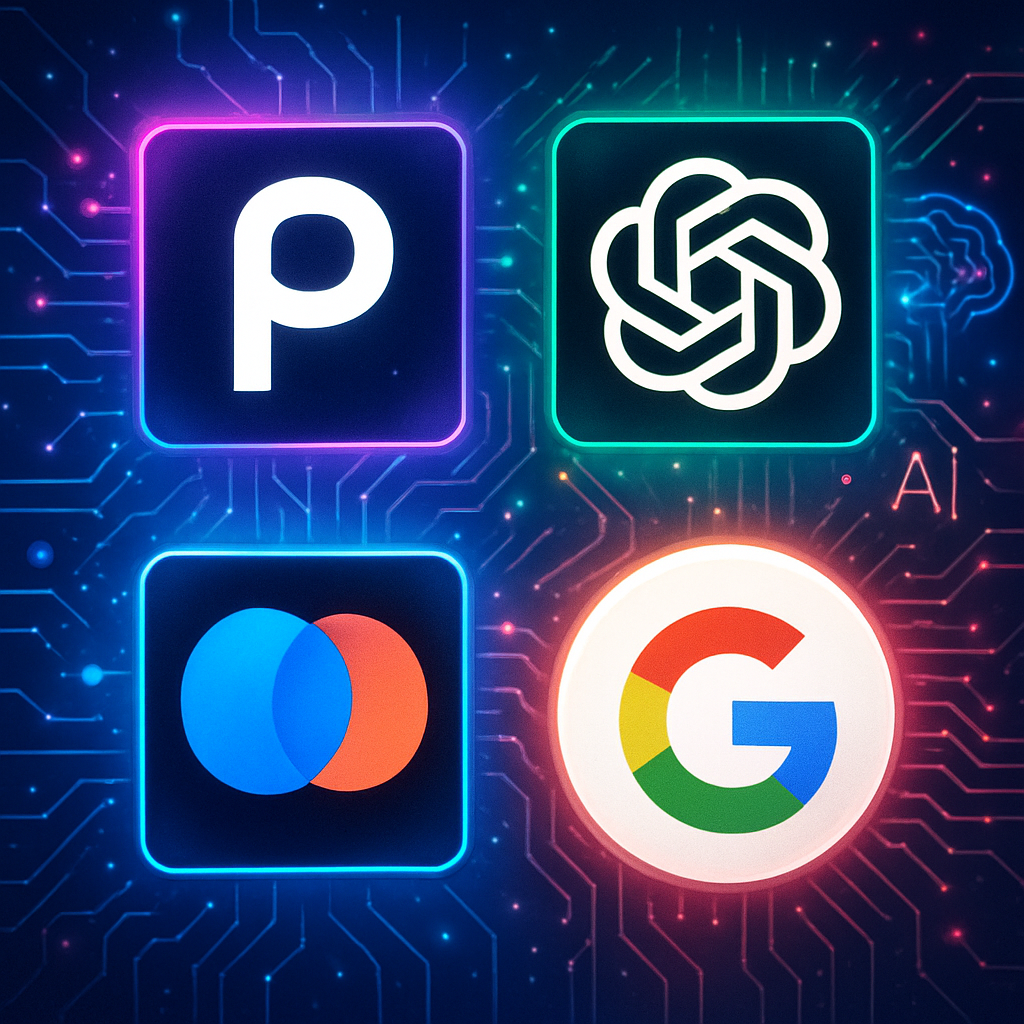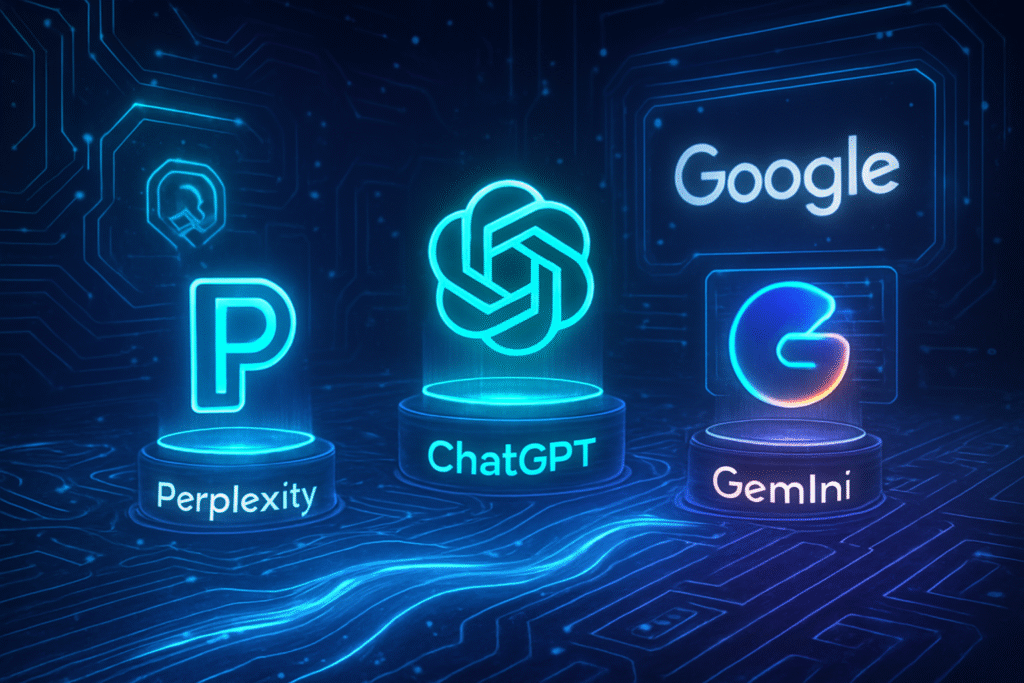
Introduction
The search engine ecosystem is undergoing a profound transformation with the rise of AI-powered search tools like Perplexity, ChatGPT, and Google Gemini challenging the long-standing dominance of traditional search giant Google. This evolution is driven by advances in artificial intelligence that enable more conversational, context-aware, and multimodal interactions with information. As the digital landscape shifts, it is vital to understand how these AI-powered search engines operate, their strengths and limitations, and what this means for users and businesses alike.
Origins and Evolution
Google has dominated the search engine market for over two decades with its robust algorithmic approach to indexing and ranking billions of web pages. Its continuous innovation in machine learning and natural language processing has maintained its edge. However, the emergence of conversational AI models—most notably OpenAI’s ChatGPT—heralded a new era of interactive, generative search experiences.
AI tools like Perplexity and Google Gemini leverage large language models (LLMs) to enhance traditional search by providing direct, contextual answers, often citing sources to establish credibility. Unlike classic keyword-based queries, these platforms understand intent more deeply and engage users in human-like conversations about their queries.
How AI-Powered Search Engines Work
AI-powered search engines blend multiple technologies—natural language understanding, machine learning, real-time web data retrieval, and multimodal input processing (text, images, video)—to deliver richer responses. Here’s a brief overview of the leading players:
- Perplexity AI: Focuses on delivering fact-based, real-time answers drawn from web data. It acts like a conversational search assistant that cites sources to build trustworthiness, making it excellent for research and information retrieval on current topics.
- ChatGPT: Renowned for its conversational capabilities, creativity, and versatility, ChatGPT extends beyond search by generating content, code, and detailed explanations. While direct real-time web searching is limited, it can access fresh information through integrations and plugins.
- Google Gemini: Google’s answer to AI-powered search, Gemini integrates deep multimodal abilities, handling text, images, audio, and even video. It connects seamlessly with Google’s ecosystem, providing an enriched, multimodal search experience that combines the strengths of LLMs with Google’s vast data services.
Key Differences and Comparative Strengths
Feature Perplexity AI Google Gemini ChatGPTGoogle Search: Best For Real-time fact-based queries Multimodal, integrated search Conversational AI & content-comprehensive search index Real-Time Web Search YesYesLimited (via plugins) Yes Multimodal Input: No/Yes (text, images, video) Limited (via plugins) Limited Content Generation Low, Medium, High, No Source Transparency Yes PartialLimited Variable Ease of Use Simple, search-style UIRich, integrated UI Conversational, versatile UITraditional search UI
Perplexity AI stands out for its speed and precision in pulling real-time, factual data and supporting academic or professional research with cited sources. Google Gemini leads with multimodal processing and integration within the Google ecosystem, making it powerful for users who rely on interconnected services. ChatGPT excels in creative, contextual, and conversational engagement, suited for users needing dynamic content generation beyond mere search results. Meanwhile, Google Search offers the widest breadth and deepest indexing but is evolving to incorporate generative AI features like Search Generative Experience (SGE) to stay competitive.
Impact on Users and Businesses
The rise of these AI search engines is reshaping how people seek information. Users now expect immediate, conversational answers that are not only accurate but also contextually rich and multimedia-capable. AI models that cite sources, like Perplexity, elevate trust and transparency relative to snippet-based answers common in traditional search.
For businesses and content creators, this new landscape demands adapting SEO strategies. Content must be optimised not just for keywords but also for context, authority, and discoverability by AI models. Ensuring content quality, structured data, and source credibility becomes paramount as AI engines pull directly from up-to-date web content to answer queries.
Challenges and Limitations
Despite their promise, AI-powered search engines face challenges:
- Data Dependence: AI’s effectiveness depends heavily on the quality and recency of web data. Perplexity’s reliance on external sources means it may struggle with novel or creative interpretation.
- Transparency and Bias: While tools like Perplexity cite sources, AI models can still propagate misinformation if the underlying data is flawed. Google Gemini and ChatGPT show progress but also face scrutiny over opacity and bias risks.
- Balancing Creativity and Accuracy: ChatGPT excels in creative generation but can hallucinate facts. Perplexity and Gemini prioritise factual accuracy but may lack creative nuance.
- Market Adoption: Despite the excitement, traditional Google Search remains dominant in usage and market share globally. AI search engines are growing rapidly but have yet to surpass Google’s scale.
The Future Outlook
The trajectory suggests continued coexistence and integration between traditional and AI-powered search. Google is enhancing its search with Gemini and AI features, blending generative answers with deep indexing. Perplexity and ChatGPT are carving specialised niches in fact-based retrieval and conversational creativity.
Future advances will likely emphasise multimodal understanding, real-time knowledge updating, and more personalised, privacy-conscious interactions. As AI search evolves, users will enjoy more intuitive, intelligent, and trustworthy ways to access the vast digital knowledge landscape.
In conclusion, AI-powered search engines like Perplexity, ChatGPT, and Google Gemini represent a powerful evolution in how we interact with information online. Each offers unique strengths—precision, creativity, and multimodal richness—that complement and challenge Google’s traditional search dominance. For users and digital professionals alike, embracing these change agents is key to navigating the future of search and knowledge discovery.
Strategic Implications and Emerging Trends
The disruption caused by AI-driven search tools extends far beyond user experience—it is actively reshaping digital marketing, content strategies, and the economics of search. Traditional SEO, which long revolved around keyword optimization and backlinks, is now giving way to AI-focused visibility strategies. Since tools like Perplexity and Gemini prioritize authority, structured data, and semantic relevance, businesses must shift toward creating content that answers questions directly, is easy for AI models to parse, and demonstrates expertise. This marks a significant pivot from search-engine-first to AI-reader-first content design.
Another critical trend is monetization models. Google has historically relied on ad revenue tied to search queries, but conversational AI alters the flow of user attention by providing direct answers instead of lists of links. Perplexity, for instance, is experimenting with subscription models, while OpenAI integrates ChatGPT Plus into its ecosystem. This diversification raises questions about how sustainable ad-driven search will be when fewer people click through to websites. Businesses may need to adapt by exploring partnerships, sponsorships, and content integrations within AI platforms themselves.
Personalization is also advancing rapidly. Unlike traditional search engines that deliver nearly identical results for similar queries, AI-powered tools can tailor responses based on user context, history, and even preferred communication style. While this creates a more intuitive experience, it also heightens privacy concerns. Striking the right balance between personalization and data security will be a decisive factor in long-term adoption.
Finally, the rise of AI search suggests a hybrid future, where generative answers coexist with traditional search indexes. Google’s Search Generative Experience (SGE) exemplifies this blending of retrieval and generation, while Perplexity and ChatGPT carve niches in precision and creativity. Businesses that embrace this duality—optimizing for both search and AI comprehension—will gain a competitive edge as the ecosystem matures.
Various Sources
- https://searchengineland.com/optimizing-ai-search-engines-461892
- https://gaper.io/perplexity-ai-vs-google-gemini-vs-chatgpt/
- https://seranking.com/blog/chatgpt-vs-perplexity-vs-google-vs-bing-comparison-research/
- https://indianexpress.com/article/technology/artificial-intelligence/google-vs-perplexity-ai-chatbots-search-traffic-2024-study-9997864/
- https://dagmarmarketing.com/blog/top-ai-search-and-answer-tools/



